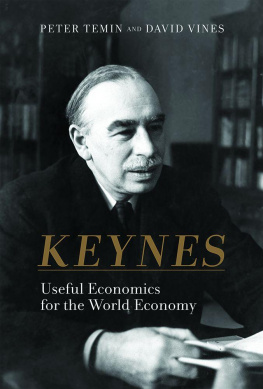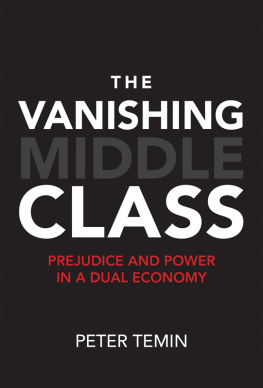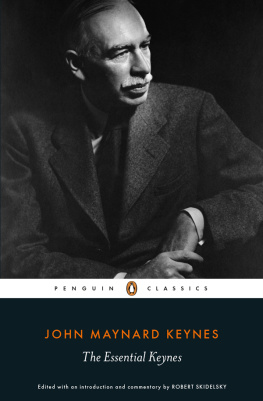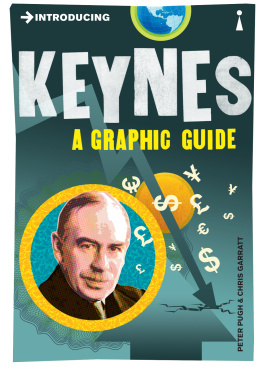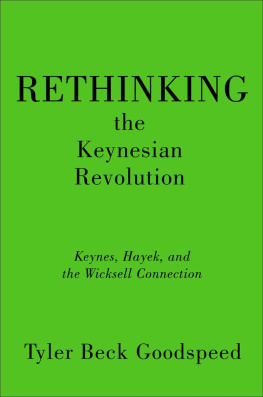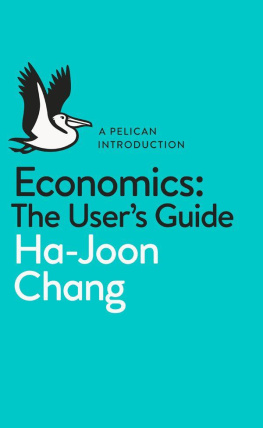Keynes
Keynes
Useful Economics for the World Economy
Peter Temin and David Vines
The MIT Press
Cambridge, Massachusetts
London, England
2014 Massachusetts Institute of Technology
All rights reserved. No part of this book may be reproduced in any form by any electronic or mechanical means (including photocopying, recording, or information storage and retrieval) without permission in writing from the publisher.
Library of Congress Cataloging-in-Publication Data
Temin, Peter.
Keynes : useful economics for the world economy / Peter Temin and David
Vines.
pages cm
p. cm.
Includes bibliographical references and index.
ISBN 978-0-262-02831-8 (hardcover : alk. paper)
ISBN 978-0-262-32195-2 (retail e-book)
1. Keynes, John Maynard, 18831946. 2. EconomistsGreat Britain. 3.
EconomicsGreat BritainHistory20th century. 4. Keynesian economics.
I. Vines, David. II. Title.
HB103.K47T49 2014
330.15'6dc23
2014010637
10 9 8 7 6 5 4 3 2 1
for Charlotte and Jane
The long run is a misleading guide to current affairs. In the long run we are all dead. Economists set themselves too easy, too useless a task if in tempestuous seasons they can only tell us that when the storm is long past the ocean is flat again.
John Maynard Keynes, A Tract on Monetary Reform (1923), chapter 3
Contents
Preface
John Maynard Keynes was an intellectual giant of the twentieth century. He created a new branch of economics now known as macroeconomics, and he played a major role in the reconstruction of Europe and of the world economy after the Second World War. We have written this short introduction to Keynesian economics because his contributions are too often neglected. In addition, they are relegated to the understanding of a single economy; his contributions to an understanding of the global economy are ignored. In a time of global macroeconomic crisis, these insights are important.
This book provides a short survey of Keynesian economics that allows readers to apply its tools to current policy debates. The exposition is set within an account of Keynes life that locates his innovations in historical time and place, describing economic thinking before Keynes to explain how difficult it was for him to escape from conventional wisdom. We set out the Keynesian analysis of a closed economy and expand the analysis to the international economy. We use only simple graphs and simple models, framed by brief narratives of the twentieth century and the early years of the twenty-first.
Keynesian economics came to be identified with the Great Depression and with the policies that were followed in the decades after the Second World Wara period now known as the golden age of economic growth. That extraordinary period came to an end in the 1970s. But after a period of crisis, we lived through another Keynesian age, with stable prices and active governments, from the early 1980s until 2008. That Keynesian age was brought to an end by a Global Financial Crisis.
As this book is being written, in the spring of 2014, our immediate problems threaten to derail our long-run goals. It is useful to recall Keynes contributions because they can help us get back onto a favorable path of economic growth. We argue that Keynes was concerned with the world economy and with interactions between countries. Those concerns were central in his work from 1919, when he reacted to the Treaty of Versailles, until 1944, when he was instrumental in constructing the Bretton Woods system of international monetary management. And although Keynes focused on the short run (as our epigraph shows), his theories were complemented by a clear understanding of the process of long-run economic growth. These interrelated aspects of Keynes insights can help us today in a global economy.
This book explains basic Keynesian ideas to enable readers to apply them to policy questions. Readers should look here for an introduction to Keynesian thought and for its application to global policy questions, not for details of the theory or its development. Only simple graphs are used to explain Keynesian economics. If you can deal with the standard picture of supply and demand (as illustrated in figure 4.1), you have enough background to understand the essence of Keynesian economics. And we argue that the world would be better if more people understood and made use of Keynesian economics. Of course, the graphs presented in this book have many implications, and economists have been expounding and debating them for many years.
We emphasize that this book is only an introduction to Keynesian economics. It is not possible to describe the workings of the complex national and world economies fully in so small a book. You would not engage a writing coach who had mastered only an introduction to the English language, and you will not be an expert on economics after reading this book. However, a few simple graphs can lead to a major change in your understanding of the basic choices involved in making economic policies. You can become a more informed citizen.
We begin with brief surveys of a few economic analyses that were current at the time when Keynes made his primary contributions. We start by introducing an eighteenth-century view of international economic relations that runs through our exposition. The introduction provides background for our description of Keynes early writing, his thinking at the start of the Great Depression and his innovations during the Second World War. We then survey the dominant description of the economic analysis of the domestic economy in the generation before Keynes to convey how hard it was for Keynes to depart from the existing conventions of economic analysis.
In the middle chapters, we present the familiar Keynesian analysis of a closed economy. We start with the simplest of Keynesian models and go on to more complex ones that include the monetary system. We explain why even the simplest Keynesian model is relevant to current conditions.
We then extend the domestic analysis to the international economy to show how important Keynesian ideas were to the reconstruction of the world economy after the Second World War and to the avoidance of another Great Depression. As with Keynes more familiar analyses, we formalize his insights in a simple graph. We discuss some current problems of the world economy to show how useful simple Keynesian models can be for understanding the policy choices we now face.
We thank Robert M. Solow for helpful comments and encouragement. We thank the members of the study group on Keynesian economics at the Harvard Institute for Learning in Retirement who road tested the manuscript. And we thank John Covell, economics editor at the MIT Press, for his enthusiasm and help.
Economics before Keynes, I: Hume
Modern economics originated in eighteenth-century Britain. This should not be surprising; in the eighteenth century Britain increased its level of economic activity to a level that had been seen only in first-century Rome and seventeenth-century Holland. But although residents of these times and places may have been as well off, neither of those precursors was on its way to the Industrial Revolution. British economic thinking, distinguished as it is, is better known than other early efforts at least partly as a result of continued economic success in the English-speaking world. We introduce a few aspects of traditional economics here and in chapter 4 to describe the intellectual context in which Keynes worked.
Adam Smith, the best known of the early British economists, wrote an enduring classic that defined economics for several centuries. The Wealth of Nations was not entirely original; Smith drew on work done by other contemporary thinkers, who of course were not regarded as economists until after Smith wrote. Smith organized these varied thoughts into a coherent view of how parts of the economy fit together through the workings of markets, and this synthetic activity made Smith the father of modern economics. Keynes also synthesized insights of other economists of his timeinsights into why the workings of markets can fail, so that resources in the economy become unemployed. Putting these new insights together created a new Keynesian theory. That theory has remained central to economics for almost a century.
Next page
